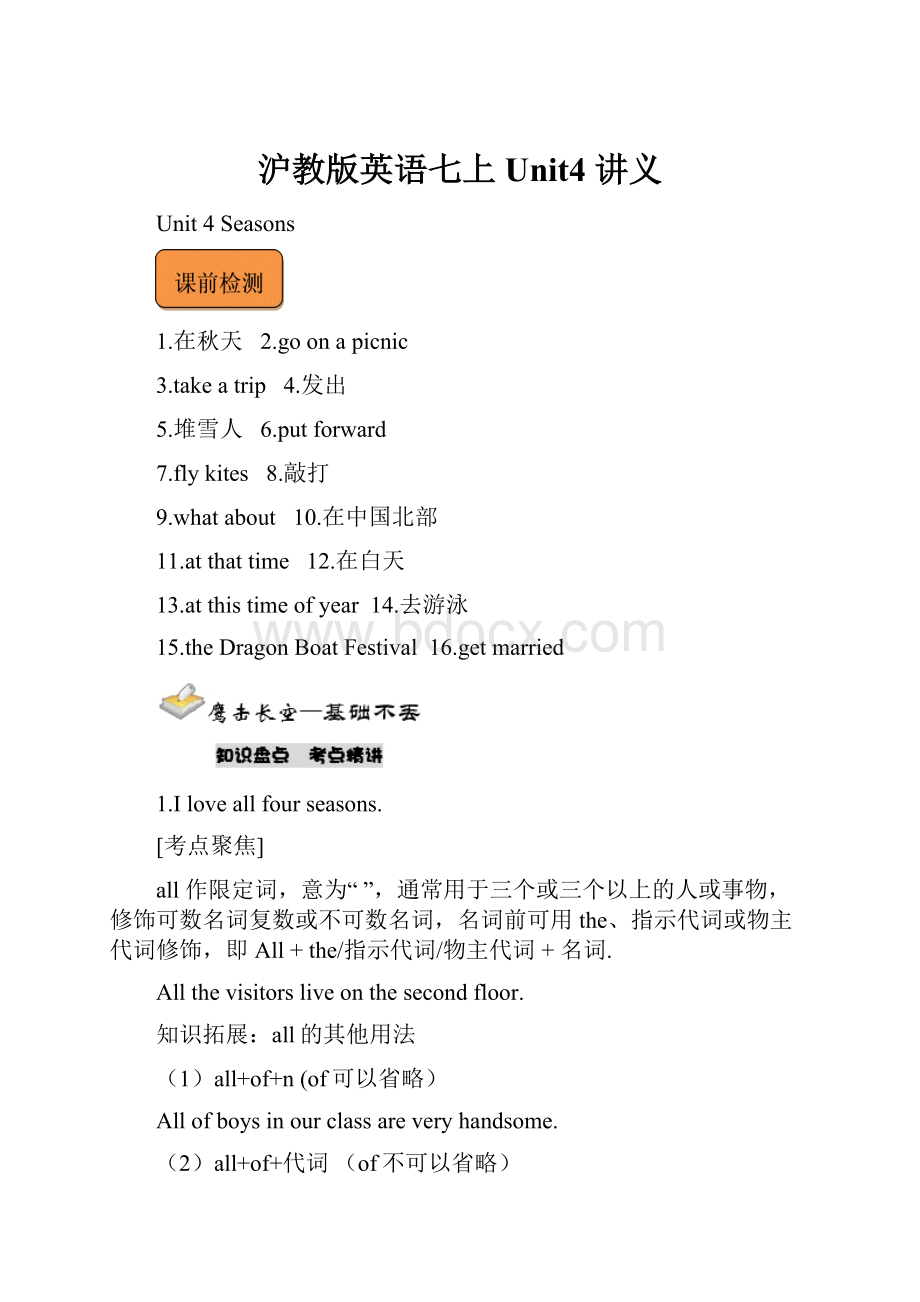沪教版英语七上 Unit4 讲义.docx
《沪教版英语七上 Unit4 讲义.docx》由会员分享,可在线阅读,更多相关《沪教版英语七上 Unit4 讲义.docx(18页珍藏版)》请在冰豆网上搜索。

沪教版英语七上Unit4讲义
Unit4Seasons
1.在秋天2.goonapicnic
3.takeatrip4.发出
5.堆雪人6.putforward
7.flykites8.敲打
9.whatabout10.在中国北部
11.atthattime12.在白天
13.atthistimeofyear14.去游泳
15.theDragonBoatFestival16.getmarried
1.Iloveallfourseasons.
[考点聚焦]
all作限定词,意为“”,通常用于三个或三个以上的人或事物,修饰可数名词复数或不可数名词,名词前可用the、指示代词或物主代词修饰,即All+the/指示代词/物主代词+名词.
Allthevisitorsliveonthesecondfloor.
知识拓展:
all的其他用法
(1)all+of+n(of可以省略)
Allofboysinourclassareveryhandsome.
(2)all+of+代词(of不可以省略)
AllofuswanttogoShenzhen.
(3)all作主语的同位语时,放在be动词之后,行为动词之前。
weallgotoschooleveryday.
(4)作人称代词的同位语时,all可以放在这些人称代词之后。
Ourteacherlovesusall.
(5)all作副词,“全部地,全都”修饰形容词、副词和介词。
weareallright.
2.Watchusgo···
[考点聚焦]
watch意为“”,是感官动词,后可接动词原形或动名词做宾语补足语。
watchsb.dosth.(强调动作的全过程)
watchsb.doingsth.(强调动作正在进行)
Iwatchedmymothercleanthebedroom.
Thebossstoppedandwatchedusworking.
类似用法的词还有:
see,hear
3.Whatistheweatherlikeinspring?
“Whatistheweatherlike?
”是询问天气状况的句型,意为“”。
相当于“Howistheweather?
”,当询问某地的天气状况时,可在后面加“in+地点”。
该句型的常用答语为“It’s+表示天气状况的形容词”。
—what’stheweatherlikeinBeijing?
=?
—It’scloudy(sunny/rainy/snowy).
1.inmyclassarehard-working.
A.AllthestudentsB.Allstudent
C.AllthestudentD.Theallstudent
2.—Whatabouttoschoolnow?
—Ok.
A.goB.togoC.goingD.went
3.我们都来自不同的国家(根据汉语意思提示完成句子)
Wedifferentcountries.
=arefromdifferentcountries.
4.Wewatchedsomeyoungpeoplefastwhenwewalkedalongthestreet.
A.driveB.todriveC.drivingD.drives
5.—theweatherliketoday?
—Itissunny.
A.HowB.What’sC.WhatD.Howis
6.—WhatdoyouthinkoftheHarbin?
—Verygood,especially(尤其)theIceandSnowFestival(冰雪节)winteriswonderful.
A.inB.atC.forD.with
5.Inspring,theweatherstartstogetwarm.
[考点聚焦]
(1)get作连系动词,意为“”,后常接形容词作表语。
Theweatherstartstogetcool.
(2)作实义动词,意为“得到,收到”
get/receivealetterfromsb.=hearfromsb.
get
表示进入或变为某种状态
常接形容词
become
多用于书面语中,强调的是由一种状态变为另一种
可接形容词和名词
turn
强调的是变得和以前完全不一样
多接形容词,接名词时零冠词
grow
指的是渐渐地变成,强调变化的过程
多接形容词,也能接过去分词
go
多用来表示进入某种状态,多接令人不悦的形容词
bad,mad,hungry,wrong
如:
Thewindisgettingstrongerandstronger.
Iwanttobecomeateacher.
Whenshesawme,herfaceturnedred.
Theboyisgrowingthinner.
Eggssoongobadinhotweather.
6.PeopleusuallyspendtimewiththeirrelativesduringtheSpringFestival.
[考点聚焦]
(1)Spend作动词,意为“”,它的主语是人
spendtimewithsb.
人+spend+时间/金钱+onsth.
人+spend+时间/金钱+(in)doingsth.
Shespendsallday(in)(learn)English.
Iusuallyspendmyfreetimemybestfriend,Tom.
Peterspendsmoneybooks.
[辨析]spend、take、pay和cost
易混词
含义及用法
例句
take
take作“花费”讲,常用于ittakessbsometimetodosth句型中
Ittookusaweektofinishthework.
cost
cost作“花费(时间、精力、金钱等)”讲,主语只能是物或事情,cost可以接双宾语,但cost没有被动语态。
Sthcost(s)/cost(sb)somemoney.
Thebikecostme200yuan.
pay
Pay作“花费”讲,主语只能是人,指为买的东西付钱,常与介词for连用。
Sbpay(s)/paidmoneyforsb
Tompaid200yuanforthecoat.
(2)during介词,“”theSpringFestival=theChineseNewYear
Don’tspeakduringthemeal.吃饭时别说话。
[辨析]during、in和for
1.during强调动作或状态的持续性,强调“自始至终”可用在表示一段时间的名词前,中间应该有定冠词the或相应的物主代词。
Duringthethreemonthshealwaysasksalotofquestions.
注意:
在表示一段时间的名词(如holiday,stay,visit,lesson,meal等)前,一般要用during
2.in常用于表示季节或月份的名词前,名词前不用定冠词。
Childrenenjoyflyingkitesinspring.
3.强调动作贯穿这一时间段,常与完成时或过去时连用。
WehavestudiedEnglishforyears.
1.Theroadisusuallyverybusy,especiallytherushhours.
A.duringB.onC.whileD.among
2.Welcometoourhotel!
Ihopeyouwillhaveagoodtimeyoustayhere.
A.afterB.duringC.withD.since
3.TwodisabledmenfromHebeiProvince(oneisblindandtheotherhasnoarms)havespenttenyearstreestogether.
A.plantB.plantsC.plantingD.planted
4.—Thegovernmentisplentyofmoneybuildingthecountryside.
—Wearepleasedwiththegovernment’sefforts.
A.costingB.payingC.takingD.spending
5.Ispentthreehundredyuanbuyingthedictionary.(改写同义句)
(1)Ispendthreehundredyuanthedictionary.
(2)Thedictionarythreehundredyuan.
(3)Ithreehundredyuandictionary.
7.MarrywillgetmaryiedonMondaymorning.
getmarry
be/getmarriedtosb
Janewasmarriedtoadoctorlastmonth
LucyandAndygotmarriedlastyear.
知识拓展:
marry的用法
(1)Marry作及物动词,意为“”,marrysb表示“”。
marry是短暂性动词,表示结婚一段时间用bemarried.
JohnmarriedMarylastweek.
Shemarriedadoctor.
HowlonghasJhonandMarybeenmarried?
(2)marrysbtosb
Shemarriedherdaughtertoabusinessman.
(3)marry作不及物动词时,往往用副词或介词短语来修饰。
例如:
Shemarriedveryearly.
8.Childrenlovewinterbecausetheylovetoplayinthesnow.
[考点聚焦]
Love在句中作动词,意为“”,相当于like。
Love后可接名词、代词、动词-ing形式或动词不定式做宾语。
lovedoingsth
lovetodosth
Weloveourcountry.
IlovewatchingTV.
Welovetogoskating.
9.Itoftenrains.
[考点聚焦]
it用于指代,在本句中it指代天气,此外,它还可以指代时间,距离等。
Itisrainingnow.Don’tgoout.
ItisDecember20.
Itisveryfarfromtheschooltothemarket.
知识拓展:
it的其他用法
(1)it指代无生命的事物或普通动物,也可以指代上文提到过的事物或者整件事。
Hereisaplasticbox.Itisuseful.
注意:
代词one也可指代上文提到过的名词,但它指的是同类事物中的一个,而不是原来那个。
Mypenislost.Ihavetobuyanew.
(2)it指代身份不明的人。
Someoneisknockingatthedoor.Whois?
10.At1a.monthatday,theclocksinallpublicplacesintheUKareputforwardanhour,from1a.mto2a.m
[考点聚焦]一般现在时的被动语态
areputforward是一般现在时的被动语态。
theclocks是动词put的承受者。
一般现在时的被动语态的基本构成为“主语+am/is/are+及物动词的过去分词+其他”.
Agreatdealofwaterisusedinthiscity.
Ithinkatleasttwobridgeareneededovertheriver.
1.WiththedevelopmentofChina,Chinesebyalargenumberofpeopleintheworld.
A.speaksB.isspokenC.speakD.isspeaking
2.Theteachertoldusnottogo(swim)aloneinthewinter
3.Mrs.ZhaowentafterfinishedherhomeworklastMonday.
A.shop;doingB.shopping;doing
C.shopping;todo
4.TomandKateforseveralyears.
A.marriedB.havemarried
C.havebeenmarriedD.havegotmarried
5.Catherinegotmarriedapolicemantwentyyearsago.
A.withB.forC.toD./
6.Wesoccer.Wehavefiveballs.
A.loveplayingB.lovestoplay
C.don’tlovetoplayD.don’tloveplay
7.Couldyourecordtoday’sNBAbasketballgameforme?
Icanwatchlater.
A.oneB.myC.yourD.it
8.Yournewbackpackissonice.Iwanttobuy,too.
A.oneB.itC.thatD.this
完成句子
1.在春天,天气开始变暖。
Inspring,theweatherstartsto______________.
2.因为秋天天气凉爽干燥,此时适合去野餐。
Itisniceto____________________________inautumnbecausetheweatheris_________and_________.
3.在冬天,天气经常寒冷并且下雪。
Winterisoften_______and_______.
4.孩子们喜欢冬天,是因为他们喜欢在雪地里玩耍。
Childrenlovewinterbecausethey______________playinthesnow.
5.过春节时,人们通常跟家人在一起。
Peopleusually_________time_________theirrelatives_________theSpringFestival.
Grammar
形容词是表示人或事物的性质、状态,一般置于它所修饰的名词之前作定语,或连系动词之后作表语。
本单元主要讲解形容词在句中作定语,表语和用在“Itis+adj.+todosth”句型中。
一、形容词的用法
1、形容词作定语
(1)大多数形容词作定语修饰名词时,其位置在被修饰的名词前,说明名词的品质或特征。
Sheisatallgirl.
Heisagoodteacher.
她是一个漂亮的女孩
(2)但在下列情况下,形容词却放在它所修饰的名词之后。
A.当被修饰的词是不定代词somebody,someone,something,anybody,anyone,anything,nobody,nothing等复合不定代词的形容词,作定语时要后置。
Iwouldlikesomethingcheap.
Isthereanythingnewinthatbook?
Ihavesomethingimportanttotellyou.
B.形容词短语作定语时,要放在所修饰的名词的后面。
这些形容词短语多由“形容词+介词/不定式符号”构成。
It’saproblemdiffculttosolve.
Ithinkheisamansuitableforthejob.
(3)enough等形容词修饰名词时可前置或后置。
Wehaveenoughtime/timeenough.我们有足够的时间。
(注:
形/副+enough,此时enough必须后置)
2.形容词作表语
形容词作表语,常位于连系动词be(am,is,are),become,get,turn,look,keep,seem等词的后面,说明主语的特征、状态或身份。
Thefoodisdelicious.
Thestoryisveryinteresting.
Gengerallyspeaking,itiscoldinthenorth,itiswarminthesouth.
注意:
以字母a开头的形容词一般不作定语,只作表语(alive,alike,alone,asleep,afraid,awake)
3.句型“Itis+adj.(形容词)+todosth.(不定式短语)”
这个句型中,常用important,interesting,exciting,nice,easy,hard,good,useful,wrong,right,important等形容词。
Itisdangeroustoclimbthishill.
Itisinterestingtoplayinthesnow.
Itisimportanttolistentotheteachercarefullyinclass.
a.此句型中,如果表语是kind,nice,right,wrong,clever,polite等描述性格、品质的形容词,则应在不定式前加ofsb.
“Itis+adj.+ofsb.+todosth.”某人做某事是……
Itisverykindofyoutohelpme.
It’scleverofyoutodoso.
b.如果形容词表示“对某人而言”,描述的是事情的性质,可在动词不定式前加一个forsb
“Itis+adj.+forsb.+todosth.”对某人来说做某事是……
It'sdifficultforustofinishthework.
It’shardformetoansweryourquestion.
二、名词变形容词的方法
1.在名词后面加-y可以变成形容词(尤其是一些与天气有关的名词)
rain—cloud—
health—luck—
(1)如果名词以重读闭音节结尾,且词尾只有一个辅音字母,这时应双写词尾的辅音字母再加-y.
Sun—fog—fun—
(2)如果以不发音的字母-e结尾的名词变为形容词时,应去掉e再加y.
noise—ice—
2.一些抽象名词在词尾加-ful可以变为形容词。
care—小心的thank—感谢的,
help—有帮助的
3.一些表示国家的名词可以在词尾加-ese,-ish或-n构成表示国籍、语言的形容词。
China—Japan—
England—America—
4.在名词后加-ous变为形容词
danger--
5.在名词后加-ly变为形容词
friend—
love—(以-ly结尾的还有lonely,lively)
6.在名词后加-less构成含有否定意义形容词。
care—粗心的use—无用的
7.一些以-ence结尾的名词,把-ence改为ent变成形容词。
difference—不同的silence—安静的
1.ThelittledancerfromAustralialooksinthelongskirt.
A.gentlyB.happilyC.beautifullyD.lovely
2.—Itrainedandlastedforalongtime.
—That’sterrible.Evensomestreetswerefullofwater.
A.hardlyB.stronglyC.heavilyD.lightly
3.—IamgoingtoAustralianextweek.
—TheradiosaysthereisgoingtobeinAustralia.Don’tforgettotakeyourwarmclothes.
A.snowB.snowyC.snowing
4.TheDragonBoatFestivalisanimportantdayinourcountry.Onthatdaywecanhavesomefoodlike“zongzi”.
A.nationalB.westernC.traditional
5.—Whataboutdoingforthehomelesspeople?
—Goodidea.
A.anythingheipfulB.somethinghelpful
B.helpfulsomething
6.It’skindyouhelpmewithmyEnglish.
A.of;toB.for;t